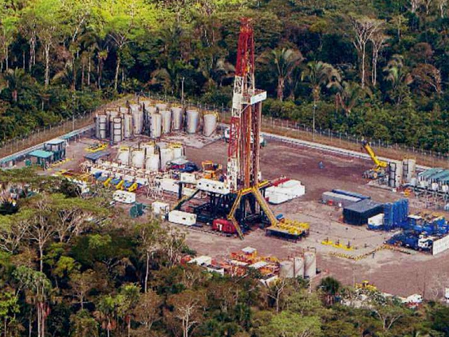Petroecuador warns of ‘massive economic impact’ if Yasuní National Park referendum is successful
The management of public oil company Petroecuador is going on the offensive against the public referendum that would end oil production in Yasuní National Park. “If this effort is successful, the country will lose billions of dollars in revenue and face large loss claims by contractors working in bock 43,” says Ramón Correa, Petroecuador general manager.
The referendum, which will appear on the August 20 ballot in the special cross death election, asks voters if they want to preserve Yasuní National Park in its natural state, eliminating extractive activities. If voters agree, oil drilling and production in the park will stop and equipment, including pipelines, will be removed.

An oil production facility in the Yasuní National Park.
According to biologists, Yasuní is exceptionally biodiverse, containing more plant and animal species per square kilometers than any other place of earth.
Environmental activist first attempted to put the referendum on the ballot in 2014 before oil drilling began but the campaign was rejected by the National Elections Commission, which claimed that thousands of petitions were illegal. Subsequent investigations determined that the government of former president Rafael Correa pressured the CNE to stop the referendum when polls showed it would pass by a large margin.
On May 8, the Constitutional Court ruled that rejection of Yasuní referendum petitions in 2014 was “unlawful” and that the referendum should be allowed to go before voters. Last week, the CNE announced it would include it on the August 20 ballot.
Ramón Correa — no relation to Rafael — concedes that “errors were committed” a decade ago but says that stopping oil production in Yasuní today would be “disastrous” for Ecuador. “Those guilty of wrong-doing should be punished but ending oil production now would punish all Ecuadorians,” he said.
According to Correa, a suspension of oil extraction would cost the country at least $16.5 billion and possibly $20 billion over the estimated period of extraction, 15 to 20 years. “We estimate that 280 to 340 million barrels of oil remain in the ground under block 43 and this is a resource needed by the government to support our annual budgets.”
Correa add: “If production ends, thousands of jobs will be lost. There will be a long-lasting ripple effect on the economy if this effort succeeds.”
Petroecuador consultant Laner Ortiz claims production in Yasuní has very limited environmental impact. “This is a very clean operation and great care is taken to protect the native environment,” he says. “In surface area, only 80 hectares of the park have been disturbed, which is only 0.01% of the total of 818,501 hectares.”
On Friday, the Yasunidos Collective, the environmental group sponsoring the referendum, said it intended to make the initiative a central topic in the presidential and National Assembly elections. “We will ask the candidates to take a position on the referendum and will distribute their responses to the public.”




















